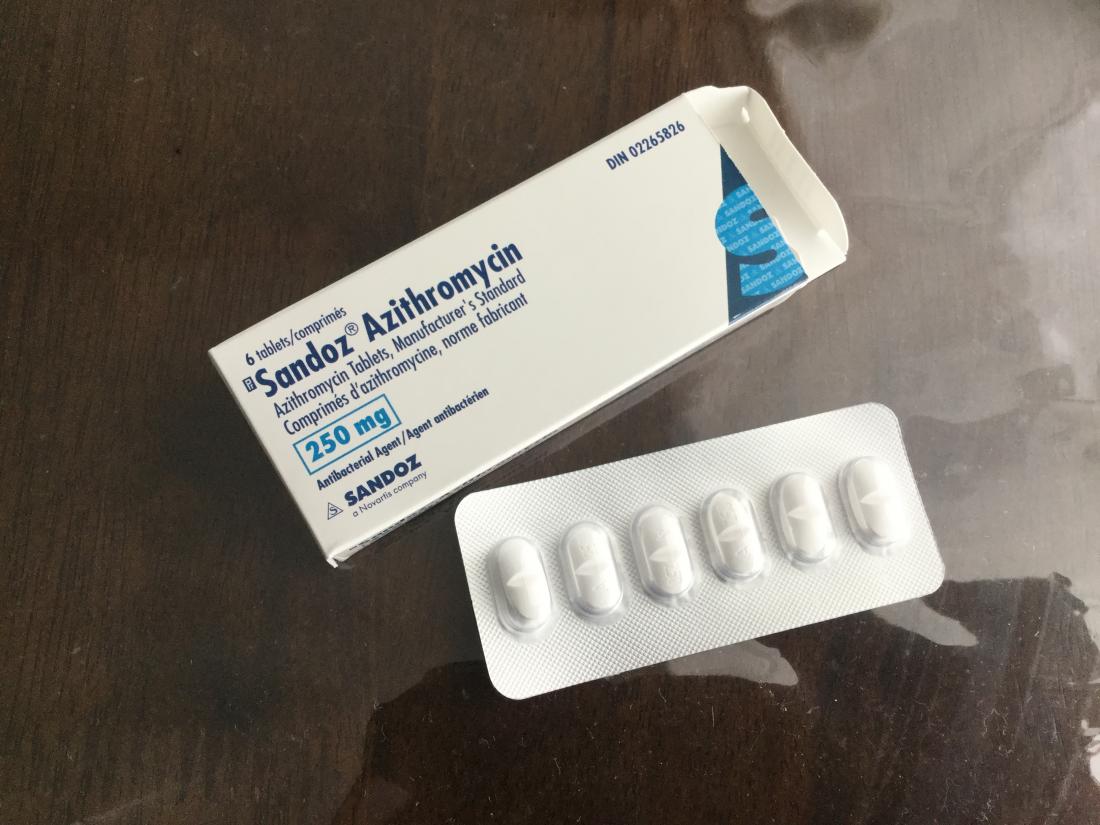What Is A Z Pack And Why Is It Prescribed?

A Z Pack, also known as azithromycin, is a prescription medication that belongs to the class of antibiotics. It is commonly prescribed to treat various bacterial infections, such as respiratory tract infections, skin infections, and sexually transmitted infections. The Z Pack works by killing the bacteria causing the infection, helping to alleviate symptoms and speed up recovery. It is important to follow the prescribed dosage and complete the full course of treatment to ensure effectiveness. Consulting a healthcare provider is essential to determine if a Z Pack is the appropriate treatment for a specific infection.
Overview Of Z Pack Medication
The Z Pack, also known as azithromycin, is a prescription medication belonging to the class of antibiotics. It is commonly prescribed to treat various bacterial infections, such as respiratory tract infections, skin infections, and sexually transmitted infections. The Z Pack works by killing the bacteria causing the infection, helping to alleviate symptoms and speed up recovery. It is important to follow the prescribed dosage and complete the full course of treatment to ensure effectiveness. Consulting a healthcare provider is essential to determine if a Z Pack is the appropriate treatment for a specific infection.
Common Conditions Treated With A Z Pack
The Z Pack, also known as azithromycin, is commonly prescribed to treat various bacterial infections. Some of the common conditions that can be treated with a Z Pack include respiratory tract infections such as bronchitis, sinusitis, and pneumonia. It is also used to treat skin infections, such as cellulitis and impetigo, as well as sexually transmitted infections such as chlamydia and gonorrhea. The Z Pack is effective in killing the bacteria causing these infections, helping to alleviate symptoms and promote recovery. Consulting a healthcare provider is essential to determine if a Z Pack is the appropriate treatment for a specific infection.
How Alcohol Interacts With Z Pack

Alcohol does not directly interact with the Z Pack medication (azithromycin) in terms of reducing its effectiveness or causing any major adverse reactions. However, it is generally advised to avoid or limit alcohol consumption while taking any medication. Drinking alcohol can potentially worsen certain side effects of the Z Pack, such as nausea, stomach upset, and dizziness. Additionally, alcohol can dehydrate the body and hinder the natural healing process. To ensure the best outcomes, it is recommended to follow the healthcare provider’s advice and abstain from alcohol while on a Z Pack.
Impact Of Alcohol Consumption On Z Pack Effectiveness
Alcohol consumption can potentially interfere with the effectiveness of the Z Pack medication (azithromycin). When alcohol is present in the body, it can hinder the body’s ability to metabolize and absorb the medication, reducing its effectiveness in treating the bacterial infection. Additionally, alcohol weakens the immune system, which is counterproductive when taking azithromycin to fight off bacterial infections. Therefore, it is advisable to avoid or limit alcohol consumption while on a Z Pack to ensure the medication’s optimal effectiveness in treating the infection.
Risks Of Combining Z Pack With Alcohol
Combining a Z Pack medication with alcohol poses several risks. Firstly, alcohol can potentially hinder the body’s ability to metabolize and absorb the medication, leading to reduced effectiveness in treating the bacterial infection. This can result in prolonged illness and delayed recovery. Additionally, alcohol weakens the immune system, making it harder for the body to fight off bacterial infections. Furthermore, alcohol and Z Pack both have the potential for side effects such as nausea, vomiting, and dizziness, and combining them can intensify these symptoms. It is crucial to avoid alcohol consumption while on a Z Pack to ensure optimal treatment outcomes and avoid potential complications.
Side Effects Of Z Pack

Z Pack, also known as azithromycin, may cause certain side effects. Common side effects include nausea, vomiting, diarrhea, stomach pain, and headache. These side effects are generally mild and go away on their own. However, it is important to seek medical attention if these side effects persist or worsen. In rare cases, azithromycin can cause serious allergic reactions, such as difficulty breathing and swelling of the face, lips, tongue, or throat. If any severe or unusual side effects occur, it is important to contact a healthcare provider immediately.
Common Side Effects Of Taking A Z Pack
Common side effects of taking a Z Pack, also known as azithromycin, may include nausea, vomiting, diarrhea, stomach pain, and headache. These side effects are generally mild and temporary, and they typically resolve on their own without requiring medical attention. However, if these side effects persist or worsen, it is important to seek medical advice. In rare cases, azithromycin can cause serious allergic reactions, such as difficulty breathing and swelling of the face, lips, tongue, or throat. It is crucial to notify a healthcare provider immediately if any severe or unusual side effects occur.
Potential Interactions With Other Medications
When taking a Z Pack, it is important to be aware of potential interactions with other medications. Azithromycin, the active ingredient in Z Pack, can interact with certain medications, such as antacids, blood thinners, and drugs that affect the liver enzymes. These interactions can affect the effectiveness of both the Z Pack and the other medications, leading to potential side effects or reduced efficacy. It is crucial to inform healthcare providers about all the medications you are taking to ensure safe and effective treatment. Always consult with a healthcare professional for personalized guidance.
Can You Drink Alcohol While Taking A Z Pack?

Although there are no known interactions between Azithromycin (Zithromax Z-Pak) and alcohol, it is generally recommended to avoid drinking alcohol while taking a Z Pack. Alcohol can potentially worsen side effects such as dizziness, nausea, and headaches, which are already common with Azithromycin. Additionally, alcohol can weaken the immune system, reducing the effectiveness of the Z Pack in treating infections. To ensure the best possible outcomes and to avoid potential complications, it is advised to abstain from alcohol while on a Z Pack. Always consult with a healthcare professional for personalized advice.
Recommendations On Alcohol Consumption While On A Z Pack
It is generally recommended to avoid drinking alcohol while taking a Z Pack. While there are no known direct interactions between Azithromycin and alcohol, combining the two can potentially worsen side effects such as dizziness, nausea, and headaches, which are already common with Azithromycin. Furthermore, alcohol can weaken the immune system, reducing the effectiveness of the Z Pack in treating infections. To ensure the best possible outcomes and to avoid potential complications, it is advised to abstain from alcohol while on a Z Pack. Always consult with a healthcare professional for personalized advice.
Safety Precautions And Guidelines
When taking a Z Pack, it is important to follow safety precautions and guidelines to ensure optimal outcomes. Here are some key points to keep in mind:
- Follow the prescribed dosage and duration: Take the medication exactly as instructed by your healthcare provider. Do not skip doses or stop taking the medication before the prescribed duration, even if you start feeling better.
- Avoid alcohol: It is recommended to refrain from consuming alcohol while on a Z Pack. Alcohol can potentially worsen side effects and diminish the effectiveness of the medication.
- Inform your healthcare provider: Be sure to disclose any existing medical conditions, allergies, or medications you are taking to your healthcare provider before starting the Z Pack. This will help them determine if any precautions or adjustments need to be made.
- Monitor for side effects: Keep an eye out for any adverse reactions or side effects while on the medication. If you experience severe or persistent symptoms, contact your healthcare provider immediately.
- Stay hydrated: Drink plenty of fluids while taking the Z Pack to help prevent dehydration and support the body’s ability to fight off infection.
By adhering to these safety precautions and guidelines, you can help ensure the effective and safe use of the Z Pack. Always consult with your healthcare provider for personalized advice and recommendations.
Conclusion

In conclusion, it is advised to avoid consuming alcohol while taking a Z Pack or azithromycin. Alcohol can potentially worsen side effects and reduce the effectiveness of the medication in treating bacterial infections. It is crucial to adhere to the prescribed dosage and duration, as well as inform your healthcare provider about any existing medical conditions or medications you are currently taking. By following these safety precautions and guidelines, you can ensure the optimal and safe use of the Z Pack. Always consult with your healthcare provider for personalized advice and recommendations.
Summary Of Z Pack And Alcohol Interaction
The interaction between Z Pack medication and alcohol is not recommended. While there are no known direct interactions between Azithromycin (Zithromax Z-Pak) and alcohol, it is generally advised to avoid consuming alcohol while taking Z Pack. Alcohol can potentially worsen the side effects of the medication and may reduce its effectiveness in treating bacterial infections. It is important to prioritize hydration and allow the body to heal itself without any hindrances. Consulting with a healthcare provider is crucial to ensure the optimal and safe use of Z Pack.
Importance Of Consulting Healthcare Providers
When taking any medication, including Z Pack, it is crucial to consult healthcare providers for guidance and advice. They have the knowledge and expertise to assess individual health conditions and determine the appropriate dosage and duration of treatment. Healthcare providers can also evaluate potential interactions with other medications or substances, such as alcohol, to ensure the safe and effective use of Z Pack. Their guidance can help prevent any adverse effects and optimize the treatment outcomes. It is essential to follow their recommendations and communicate any concerns or questions to ensure the best possible care.
Clarifications On Z Pack Usage And Alcohol Consumption
When it comes to using a Z Pack and alcohol consumption, there are a few key clarifications to keep in mind. First and foremost, it is generally recommended to avoid drinking alcohol while taking a Z Pack. Alcohol can potentially interfere with the effectiveness of the medication and may increase the risk of side effects. It is important to follow the instructions provided by your healthcare provider, as they can provide personalized recommendations based on your specific health condition and the medication dosage. Additionally, it is best to consult with your healthcare provider if you have any questions or concerns about using a Z Pack with alcohol.
Additional Information On Medication Interactions
It is important to note that alcohol is not the only substance that can interact with medications. There are many other substances, including certain foods, beverages, and even herbal supplements, that can interfere with the effectiveness of medications or increase the risk of side effects. It is always recommended to inform your healthcare provider about any substances you are using or plan to use while taking medications. They can provide guidance on potential interactions and help ensure your safety and the effectiveness of your treatment. Remember, it is crucial to follow your healthcare provider’s instructions and consult with them for personalized advice.
FAQ About Z Pack And Alcohol: Understanding Medication Interactions
Q: Can I drink alcohol while taking Z Pack?
A: It is generally recommended to avoid consuming alcohol when on Z Pack (Azithromycin) as it can increase the risk of side effects like nausea, vomiting, and dizziness.
Q: How long should I wait after finishing Z Pack before consuming alcohol?
A: It is advisable to wait at least 72 hours after completing the Z Pack course before consuming alcohol to ensure the medication has cleared your system.
Q: What are the potential risks of mixing Z Pack with alcohol?
A: Combining Z Pack with alcohol can reduce the effectiveness of the medication, prolong the recovery period, and increase the likelihood of experiencing adverse effects on the liver and stomach.
Q: Are there any specific symptoms to watch out for if I mix Z Pack with alcohol?
A: Symptoms such as increased dizziness, stomach upset, irregular heartbeats, and liver toxicity may occur if Z Pack is taken with alcohol. It is important to seek medical advice if you experience any unusual symptoms.
Q: Can moderate alcohol consumption be safe with Z Pack?
A: Even moderate alcohol consumption can have negative effects when combined with Z Pack. It is best to refrain from drinking alcohol altogether while taking this medication to avoid potential interactions and health risks.
Q: Is it okay to consume non-alcoholic beverages while on Z Pack?
A: Yes, you can consume non-alcoholic beverages while taking Z Pack. It is essential to stay hydrated and follow a healthy diet to support your recovery process and minimize any potential side effects.

A local, family-owned fast food and ice-cream diner in Wind Lake, Wisconsin. We might be small, but we are big on fast-friendly service with everything cooked to order. B-Lazy Diner offers chicken and fish fry buckets, served up with French fries and our famous homemade coleslaw and tarter sauce, along with a variety of wraps, seasoned burgers, homemade soups, and, of course, ice cream cones, sundaes, malts, and shakes.